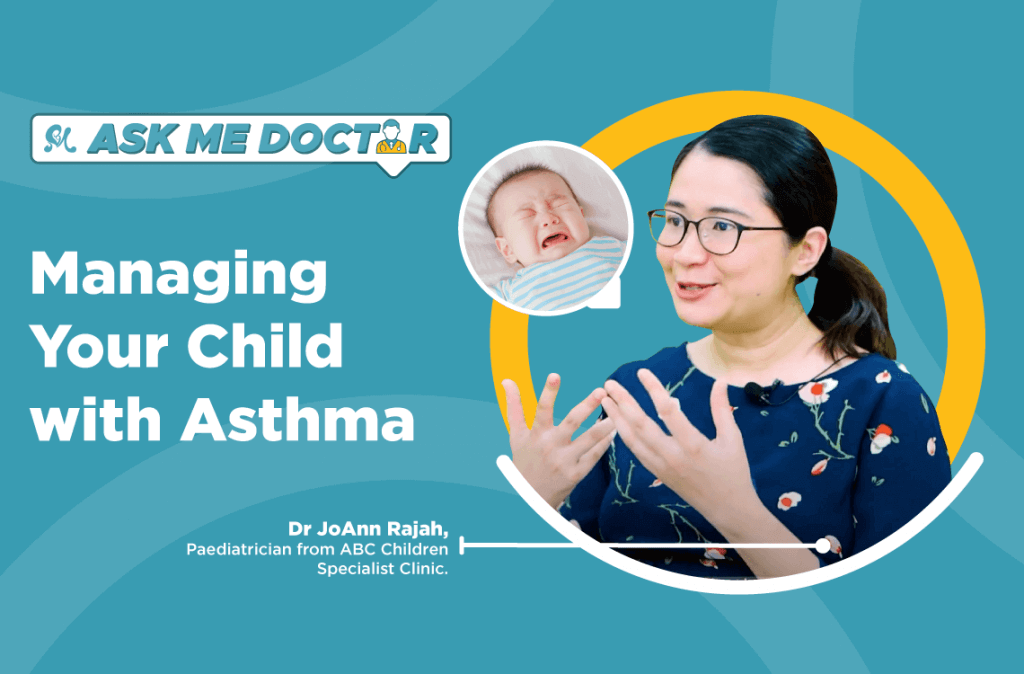Asthma is a condition that affects many individuals in Malaysia.
50% of the children with asthma starts experiencing wheezing as early as the age of 6.
Any child with poorly controlled asthma can have increased number of missed schools, hospital admissions, and even death in severe cases.
Asthma is not curable but it is manageable with proper care. Dr JoAnn Rajah, a paediatrician for ABC Children Specialist Clinic is here with us to share more about asthma.
Q1: An overview of asthma.
Dr JoAnn: Asthma is one of the most common Chronic Respiratory Diseases in children.
Asthma is defined as an episodic and reversible airway narrowing in response to infections, environmental allergens and irritants.
The number of children with asthma has been increasing steadily over the years, comparable to other allergic conditions such as eczema and allergic rhinitis.
In fact, in Malaysia, about 7% of children below 18 years have asthma. The incidence of asthma is also seen more in children living in the city rather than in the rural areas.
Q2: Is there any other signs of asthma?
Dr JoAnn: Other symptoms of asthma can include wheezing, which is a high pitch whistling sound and chest tightness.
Symptoms of asthma usually are episodic and recurring especially in the presence of triggers.
Q3: What are the common causes of asthma?
Dr JoAnn: The occurrence of asthma is a combination of underlying genetic predisposition and interaction with environmental allergens or irritants.
Any child who has a parent with an allergy-related condition has a 30 to 40% of developing allergic conditions, asthma included.
The risk increases to 60 to 80% when both parents are affected.
Q4: What are the things that trigger an asthma attack?
Dr JoAnn: The trigger factors for asthma can include the following:
- Viral infections: Viral infections for example Rhinovirus, RSV virus, parainfluenza virus and influenza virus are usually quite notorious to cause asthma to flare up.
- Air pollutant: Cigarette smoke, fragrances, cleaning product and chemical can also lead to a child having an asthmatic attack.
- Indoor allergens: This includes animal dander, cockroaches and house dust mites.
- Outdoor allergens: Outdoor allergens are also quite notorious as well and that includes pollen shared from trees, grasses and even mold.
- Cold air and cold weather: These two can also aggravate asthma symptoms.
- Stress and anxiety
Q5: What will be the time needed for me to bring my asthmatic child to see a doctor?
Dr JoAnn: Basically all children with asthma should know how to manage an asthma attack or have an Asthma Action Plan.
A child with asthmatic attack should see the doctor if the symptoms do not improve with inhaled salbutamol or if the symptoms are severe with breathing difficulties.
Q6: Can you share with us what will be the complications of this health issue?
Dr JoAnn: Any child with poorly controlled asthma can have increased number of missed schools, hospital admissions, and even death in severe cases.
It can be life-threatening if it not manage well.
Q7: Is there any way we can prevent this problem?
Dr JoAnn: Although there is no cure for asthma, however, there are certain ways to prevent it such as avoiding the trigger factors and it is very important for any child with asthma to receive annual influenza vaccination.
Q8: Should my child avoid doing physical activities just to prevent asthma attack from happening?
Dr JoAnn: So, this is a strictly no. The main reason why asthma should be treated and kept under control is to allow the child to live just like any other healthy children.
In exercise-induced asthma, using Salbutamol inhalers 15 to 20 minutes before exercising can prevent symptoms.
With regards to asthma, it is crucial to know and avoid the trigger factors. Both parents and children should also know what to do when asthmatic attack. So, talk to your doctor, epecially if you have any questions on how you can improve your child’s asthmatic symptoms.
Again, asthma is not curable but it is preventable.
If you have a child with asthma, make sure to keep your eyes on him and always consult the doctor to treat it and prevent damage to his growing lungs.
Stay tuned with our AskMeDoctor! series at both our Facebook page and Motherhood Story.
